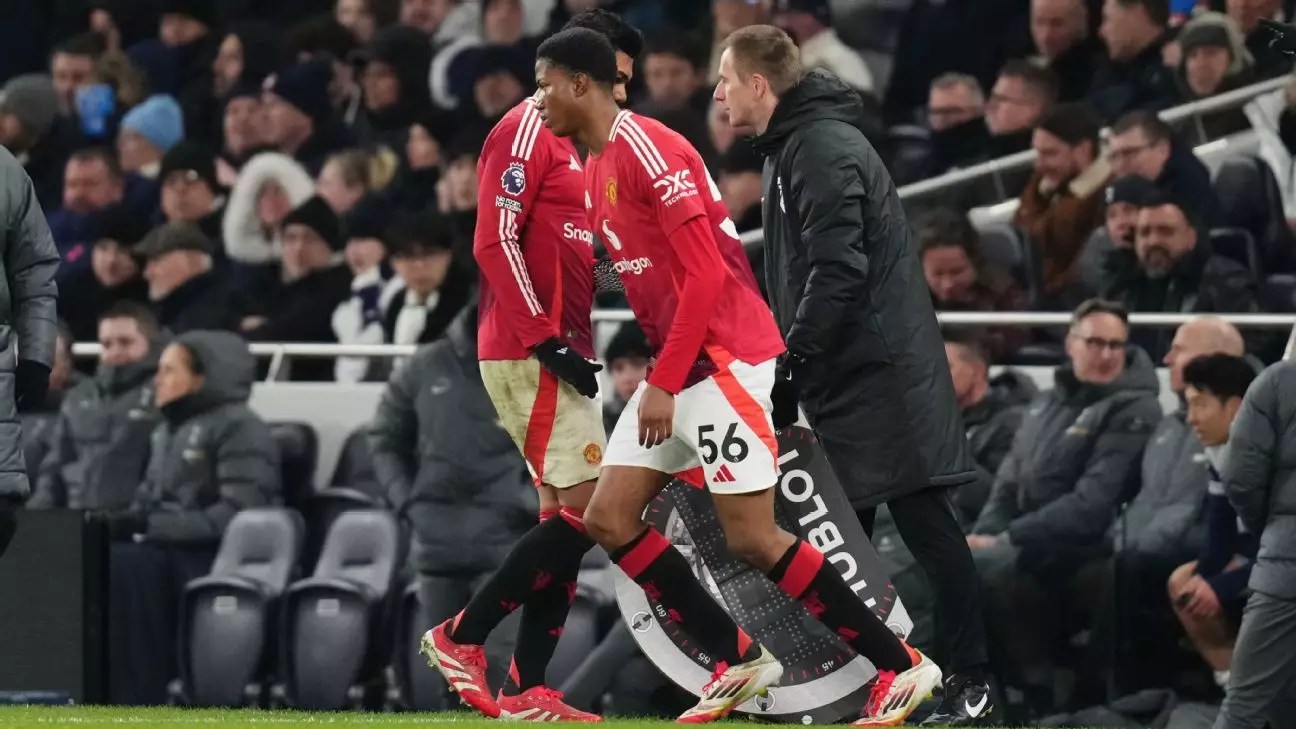Manchester United, a name that reverberates with memories of legendary performances and iconic moments, now finds itself in a bewildering state of transition—one that has left fans, players, and analysts questioning the club’s direction. The recent loss to Tottenham, which ended 1-0, spotlighted a broader issue: the perilous plight of fielding young, inexperienced players in high-stakes matches as a means to solve a deep-rooted crisis.
In an era when youth is often hailed as the beacon of hope for a football club, Manchester United’s decision to throw 17-year-old Chido Obi-Martin into the fray during a crucial moment against Tottenham illustrates a dramatic gamble. While there have been exalted moments in the past where young strikers such as Federico Macheda and Marcus Rashford provided much-needed sparks, the contrasting backdrop of the club’s current predicament paints a very different picture. Obi-Martin’s debut, far from being a tale of legendary beginnings, turned out to be a stark reminder of the pressing needs that remain unaddressed at United.
The introduction of young talents has historically been a double-edged sword. On one side, there’s the excitement and promise they bring. On the other, there lies the haunting reality of substituting youthful exuberance for experience—an approach that risk leaving the team vulnerable in critical situations. Obi-Martin did not touch the ball in his debut, further raising questions about whether he was truly prepared for such a high-pressure environment. Was it a strategic misstep by manager Ruben Amorim, or does it reflect a broader issue of player development and readiness within the United Academy?
Manchester United’s woes deepened as they fielded an astonishingly young lineup with a bench that consisted primarily of teenagers. Injuries to key players like Amad Diallo and Kobbie Mainoo compounded the club’s problems, exemplifying their shallow depth. The fact that seven of the eight substitutes had been born post-Glazer ownership speaks volumes about the current state of the club’s recruitment and youth integration strategies. This scenario raises an uncomfortable question: when did it become acceptable for a club as storied as Manchester United to find itself in such a tumultuous situation, relying heavily on the untested youth?
The reasons behind this crisis can be traced to a combination of poor strategic planning, inadequate recruitment, and a prevailing culture that seems to overlook the value of experience. When a club is staring down the barrel of a potential relegation battle, which United is thankfully not facing at this moment, the last resort should not be to thrust underprepared teenagers into the limelight; instead, clubs must find a way to maintain competitive experience while integrating youth incrementally.
Ruben Amorim’s decisions have drawn scrutiny; while it is commendable to trust young players, there comes a time when pragmatism must prevail over optimism. One wonders whether Amorim had other options or if his faith was simply misplaced. As the team’s performance flounded in the face of a fragile Tottenham side, he must be wary of repeating the same gamble whenever things get rough. The question remains: How much weight should be placed on the shoulders of these youngsters, particularly when the stakes are so high?
The current managerial approach of minimizing the focus on the broader problems, as Amorim suggested, is a dangerous tactic in the turmoil of a footballing season. The emphasis must shift towards addressing immediate performance issues, rather than merely hoping that everything will work out over time.
Despite a moment of respite for Tottenham, who secured this much-needed victory, Manchester United must confront the grave reality that without significant changes, the ‘historical club’ label may hold less weight among their supporters. The juxtaposition of a club with rich history experiencing an unfortunate string of failures is jarring. Yet, amidst the chaos, there remains a glimmer of hope: recognition of the problem often leads to a pathway for resolution. Solutions may involve investment in experienced players and a focus on recruitment policies that do not sacrifice depth for the sake of youth integration.
Fans may soon grapple with the undeniable truth: the time for reckoning has come. The local community’s voicing its discontent should serve as a catalyst for real change, focusing not merely on preserving a legacy but on establishing a foundation for a successful future. Only then can United begin to reclaim its former glory, rather than simply creating unwanted folklore of missed opportunities.


Leave a Reply